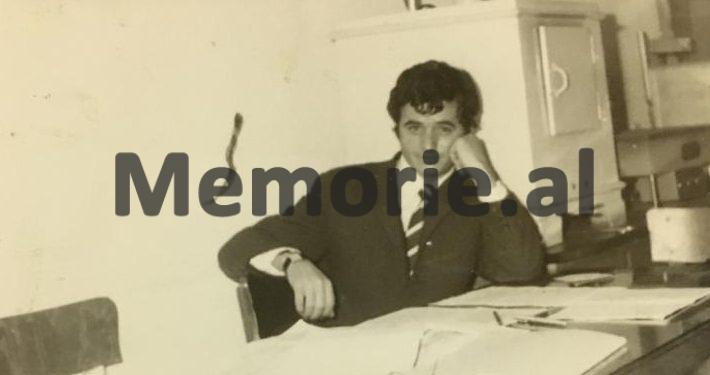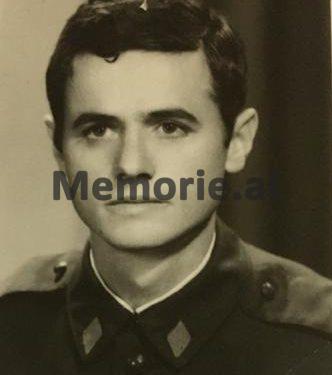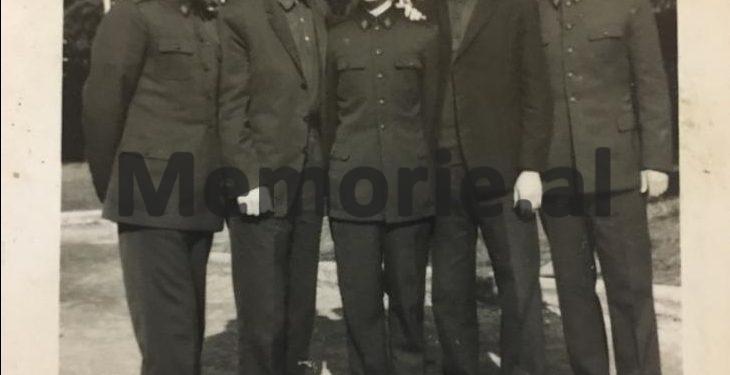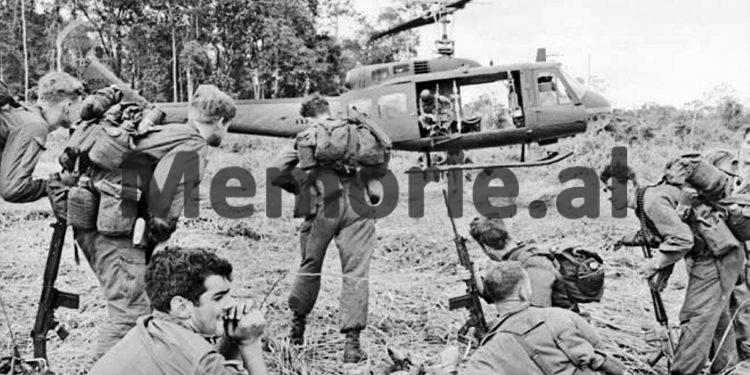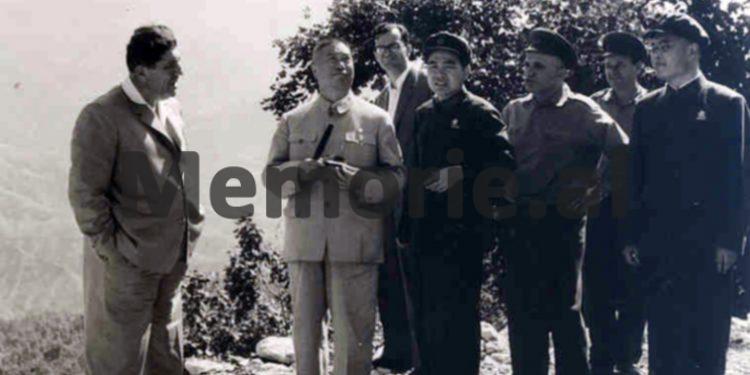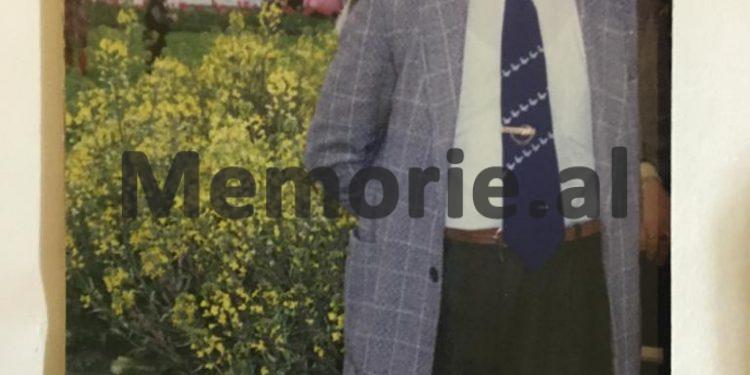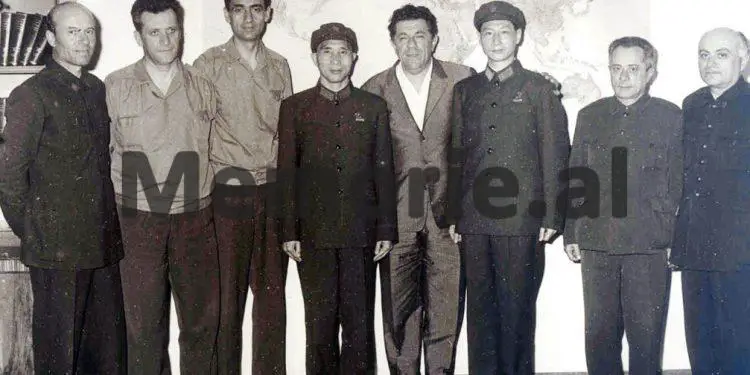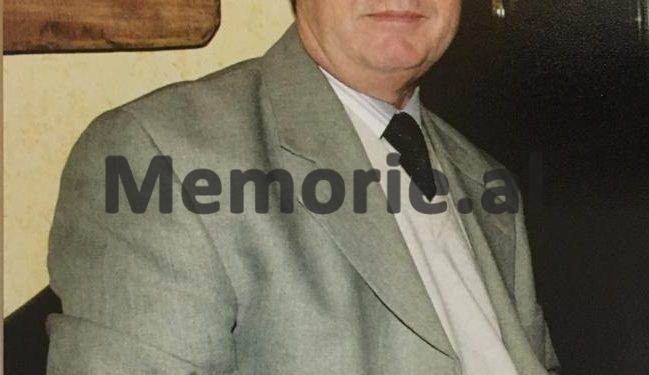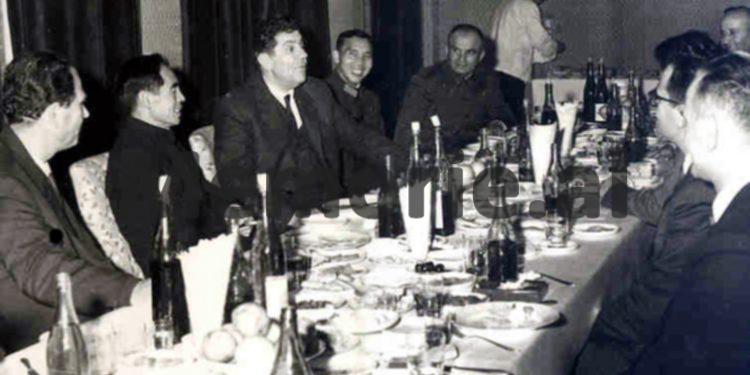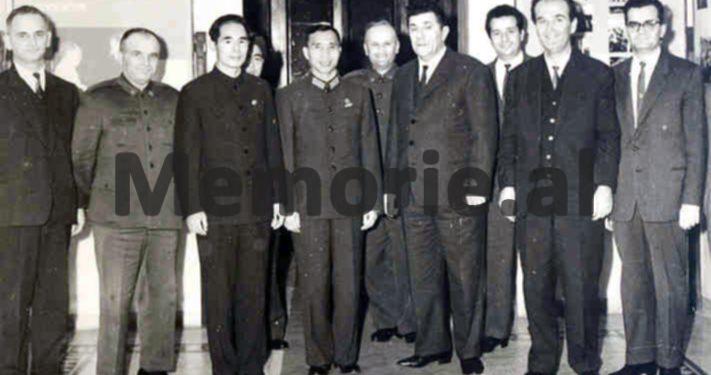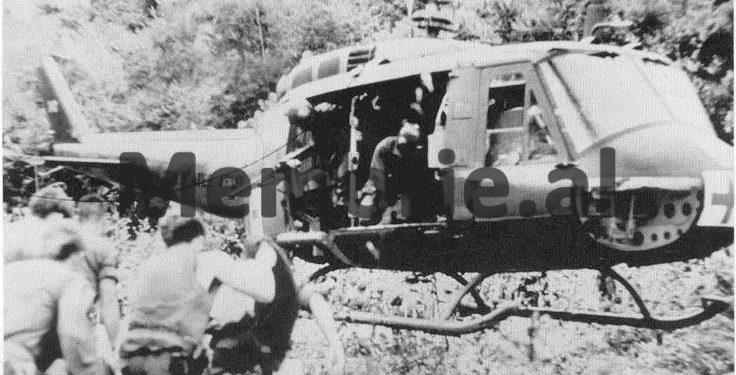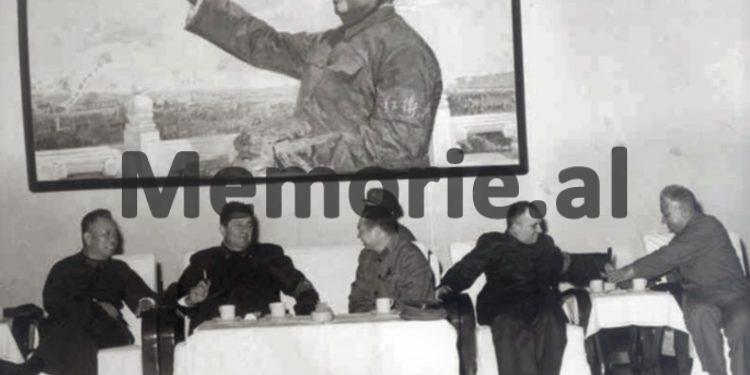Dashnor Kaloçi
Memorie.al publishes an unknown story in late 1979, when Prime Minister Mehmet Shehu, who also held the post of People’s Defense Minister, ordered a secret mission to Vietnam to send a group of seven top Defense Ministry servicemen to at the head of the Albanian Army Chief of Staff, Gaqo I., who had the specific task of asking their North Vietnamese counterparts the famous Soviet-made SAM-7 rocket, which when tested for the first time had to the surprise of the West, as much as the Americans had declared that “the tank could no longer be called a weapon of war” ?!
The rare testimony of Memush Habilaj, a former member of that secret mission and then acting Director of the Central Chemical Research Laboratory at the Ministry of Defense, regarding the special orders given to that group by Prime Minister Mehmet Shehu and the Minister of Works Foreign Minister Nesti Nase, for that mission to be kept secret, the itinerary of many voyages and the intervention of Ambassador Sokrat Plaka in Belgrade, the reception received from their North Vietnamese counterparts, and how it was deconstructed. mission, as much as they had written for some French and Serbian magazines, which Mehmet Shehu told them after the group returned from Vietnam!
Testimony of Military Engineer Memush Habilaj: “In October 1979, along with seven other colleagues from the Ministry of Defense, went to South Vietnam on a very secret mission. Mehmet Shehu had told us that they should at all costs take any kind of dollar price in hand, the famous SAM-7 missile that had surprised the West, which the Chinese had rejected. ”
“Our military mission in Vietnam lasted for about two months and in December 1979 when we returned to Albania, the Prime Minister and Minister of Defense, Mehmet Shehu, called on our Chief Gaqo I. to let him know that despite numerous measures that had been taken for camouflage, our mission was deconstructed and to prove it, he told two foreign newspapers (Serbian and French) that had published all the names of our group members and the purpose of why we had gone to Vietnam. So remembers the former senior Defense Ministry soldier, Memush Habilaj, in his exclusive interview with Memorie.al, the secrets of that secret mission of Albanian servicemen who went to distant Vietnam in October 1979, following the order of Mehmet Shehu.
What was that mission, who were the other members of the group, and why was it kept secret? What were the orders given before the departure by Deputy Defense Minister Nazar Berberi and Prime Minister Mehmet Shehu? What was the famous weapon that had puzzled the West, which the Chinese had refused to give to Albania, and why Mehmet Shehu had cut his orders and asked the Albanian military mission to take it to Vietnam at all costs, even if paid in dollars with whatever amount they were asked for ?! What help had the Albanian Army given them to North Vietnam when they were fighting with South Vietnam, and what did they require from that mission that they were sending?
What did Foreign Minister Nase Nase say to them before departure, and how the mission of the Albanian servicemen was camouflaged on that distant voyage where all the Albanian ambassadors to the countries where they were to transit were ordered to go out airports and take steps to prevent the “trade delegation” trip from failing? How was the trip accomplished, and how was Socrates Plaka avoided that mission’s possible failure by the airport employees’ strike in Belgrade? How did they arrive at Saigon Airport and why were the passengers on that line surprised when the “Albanian Trade Delegation” was greeted by the luxurious “Benz” who approached the staircase ?!
Who hosted the mission of the Albanian soldiers in Hanoi, why they were sent to the American-built palace, how they were followed at every step by Soviet agents, and why they went all the way to Cambodia ?! What kind of data and weapons did the Ministry of Defense’s military engineers’ mission get and why the Vietnamese were reluctant to give them much of the weapons and fighting technique they requested ?! Concerning these and other secret and unknown sides of that military mission that went to Vietnam 41 years ago, he introduces us to his exclusive interview with Memorie.al, a former military and chemical engineer, Memush Habilaj, former Director of Central Laboratory of Chemical Research of the Ministry of Defense.
Mr. Habilaj, what task did you have when you went on a mission to Vietnam?
In 1979, when it was decided that a military delegation would go on a secret mission to Vietnam, I was a chemical engineer at the Central Chemical Research Laboratory at the Ministry of Defense.
Under what circumstances and why was that mission decided to go to Vietnam?
The Albanian Army, at least since the early 1960s, had been regularly supplied with weapons and combat techniques by the People’s Republic of China, and for the period we are talking about, in 1979, it was almost two years that Albania had disrupted relations with China, and the Albanian Army struggled to recognize and dispose of the chemical weapons it had previously acquired. At the time of its breakup with China, Albania had no other link to supply with the armaments of the time, and in those conditions, there was no word about being linked to any other country because we were declared the only communist country in the world. world. Given the situation we were in, the only opportunity left for us to see the world and the weapons we needed was Vietnam. That was the reason why our mission was decided to go to Vietnam.
What was the real purpose of your coming to Vietnam?
After the end of the war in Indochina, a large number of weapons and warfare remained in the hands of these countries, which were supplied by the United States, the Soviet Union, and some other countries that had sold these weapons to the warring parties… At that time the Indochina countries had simultaneously become an experimental site where all new weaponry was tested. By 1979, when our mission was deployed to Vietnam, it had been four to five years since the Vietnam War with the Americans had ended, and the situation had stabilized. During that war that lasted many years, many of these new weapons and the latest combat techniques were available to both the Americans who supplied South Vietnam and the Soviets who supplied North Vietnam. Given this, it was thought that a military delegation of ours would go on a mission there and see these weapons at their disposal, then considered to be our enemies. We needed not only to see these weapons but also to supply them so that the Albanian Army would have those weapons.
Did you know about those weapons that were used in the Vietnam War?
In bracket, I wanted to point out that at that time, we were not the first delegation to go to Vietnam. Some missions with the Ministry of Defense officers, who were familiar with the various weapons used there, had left Albania since the war. Likewise, after the end of the war, the Albanian government entered into a bilateral agreement with the Vietnamese, and as a result, several teams of Albanian officers went to Vietnam. We were aware of the weapons that were used and continue to be used there and by the continued links we had with China. In addition, with regard to weapons used in Vietnam, we had knowledge and input from both foreign and military press specialized in the necessary literature of these countries, which we provided through our Discovery channels of the Army, “according to the orders we gave them. So from this data available to us, we had some insight into the weapons used in Vietnam.
What were the relations of the Albanian Army with the Vietnamese at that time, and had you previously received weapons from Vietnam?
Since the Vietnam War, the Albanian government has politically supported the North Vietnamese, both through propaganda in the press and in the international arena, and materially, by sending various aids such as oil, bitumen, mineral resources, cigarettes, etc., that went by steam to China and thence to Vietnam. In this context, the Albanian Army also assisted the Vietnamese Army by sending them medicines, medicines, food, clothing, contraceptives, etc. Of course, these were modest and symbolic aids, which did not play a major role in that war.
When were you announced that you were going on a mission to Vietnam?
In October 1979, we were informed that a delegation from the Ministry of Defense would go to Vietnam and that delegation would consist of seven engineers of various professions, ranging from the fields of Chemistry, Engineering, Liaison, Armament, etc. In this delegation, I was informed that I would be part of it too.
Who were the head of your delegation and the other members of its delegation?
The head of the delegation was the Director of Army Armament, Gaqo I., and I was represented by the Director of Chemistry, Johan Furji from Liaison, Nuro Brato from Genjo, and three other comrades.
How did they communicate and who was called to give you the appropriate tasks that each of you would perform in Vietnam?
Our team of seven were all called into one of the MOD offices, and the mission head, Gaqo I., introduced us to all the tasks that each of us in the group would perform throughout our mission. Gaqo I. had personally received these duties from Prime Minister Mehmet Shehu, who had called him to the office and had given him in writing of any action we would take in Vietnam.
What was the main task that Mehmet Shehu gave to the head of your mission Gaqo I. before leaving?
Of the many tasks assigned to our mission in Vietnam, the foremost of which the Minister of Defense, Mehmet Shehu, insisted more on our chief of mission, giving it a special message, was what we needed to get at any cost, at any price, even paying in dollars for the famous SAM-7 rocket. That missile, manufactured by the Americans and the Soviets, and when tested for the first time, for the efficiency it gave, had astonished the West so much that the Americans were forced to say that after that, “the tank could no longer be called a weapon of war”. We had requested this rocket (Soviet production) from the Chinese and they had refused it and had not given it to us.
What was that rocket insisting on at all costs, and why did it need the Albanian Army?
The SAM-7 rocket launcher was a small weapon used to hit tanks, and its target was up to 2,800 meters. It could be easily used, even against aircraft and helicopters flying up to 1000 meters. This weapon, which can be used by a soldier, via remote control, follows the target itself until it is destroyed. For the first time, it was used in the 1973 Arab-Israeli War, where it was widely used, and destroyed hundreds of Israeli army tanks. According to the resource we were given, we had to insist at all times on getting the model of this weapon, which we would then have to manufacture in Albania, with our military industry. This weapon was needed by the Albanian Army because, based on the country’s defense strategy, which was approved by the Supreme Defense Council, it was assumed that an eventual attack on our country would be carried out with tanks, and the SAF missile insisted that -7, had to be available at all costs from our armed forces.
What was the task assigned to you personally on that mission?
The task that I would perform as part of that mission was communicated to me by the Director of the Ministry of Defense’s Chemistry, Enver Lagji. He let me know all the problems our Chemical Weapon had, and my first task was to get interested in new chemical protection tools and techniques, such as anti-gas, etc. Secondly, I had to be interested in the chemical signaling apparatus, and thirdly, I had to gather as much information as possible about all kinds of chemical weapons used in the Vietnam War. These new techniques, we had to get them in order for the Albanian Army to be on par with other armies. These were the only assignments my boss, Enver Lagji, gave me, and each of the mission members received instructions from his boss.
In addition to the specific professional tasks assigned to each of you, were they given any other instructions on how to act in that mission?
Yes, in addition to the tasks given to us by each one of us, prior to departure, he called us to his office, Deputy Minister of Defense, Nazar Berberi, and gave us all specific instructions on how to behave and act during the days that we would stay in Vietnam. These tasks were given to us in detail, and we had no right to do anything except what we were told. All of these were provided in writing by Mehmet Shehu. After the assignment, just before departure, the Deputy Minister of Defense, Maliq Sadushi, came and greeted us. After leaving the Ministry of Defense, we went to the Foreign Ministry, where we received further instructions regarding our mission in Vietnam.
What were these instructions and who gave them to the Foreign Ministry?
At the Foreign Ministry, our delegation was hosted by the Minister himself, Nesti Nase and his deputy Reiz Malile. During that reception, they gave us new instructions affecting the Foreign Ministry, and Minister Nase introduced us to the political situation in our country, as well as Albania’s relations with Vietnam and Cambodia, as well as the relationship between the two themselves. countries. At that time, Vietnam had invaded and occupied Cambodia, overthrowing the Pol Pot clique. Minister Nase told us that at that time, Vietnam was regarded as an aggressor in the eyes of the world, and our mission was to be kept in the highest regard. He also introduced us to the situation in Cambodia, telling us that: “Albania is holding an embassy, a staff of five, and we are sacrificing those who are in a house surrounded in the midst of war. , and where the only food there is, rice, is brought in by soldiers. If we don’t have what we’re doing, we have to cooperate with them. ” He also introduced us to the current situation in Vietnam, which fought with Cambodia which had occupied it since February of that year. China, meanwhile, had invaded Vietnam in its northern part, and although a ceasefire had been established, the state of war was still prevalent throughout the country. At the end of his speech, Minister Nesti Nase told us: “You have to be careful, that to understand them, the Vietnamese will never understand them, because the Communist Party of Vietnam, led by Ho Chi Min, claims to become the leader of all Communist parties of Indochina, taking the role of the main leader. But we have to cooperate with them, even though they are out of our logic. ” After talking to Minister Nase, we were welcomed by the accredited Vietnamese Ambassador to our country.
follows tomorrow
Who is Memush Habilaj?
Memush Habilaj was born in the city of Vlora on January 14, 1949, and his family comes from the village of Vërmik. In 1967, after graduating high school at the Halim Xhelo Gymnasium of Vlora, he was granted the right to study at the Faculty of Natural Sciences at the University of Tirana, in the Chemistry-Industrial branch. In 1972, Memushi completed her studies at this faculty and graduated as a Chemical Engineer. Although in his final year of study he was appointed to work as a lecturer at that faculty, upon graduation, he was assigned to specialize in several officer courses, having been appointed to the Ministry of Defense. After specializing in these courses, in 1973 he was appointed as a specialist at the Army’s Central Chemical Research Laboratory at the Ministry of Defense. In that lab, he worked on various assignments and from 1990-1993 he was the director of that lab. In 1993 he was released early, as a result of the reforms made in the Albanian Army following the country’s political changes. In addition to this assignment, Memushi worked as a lecturer at the Military Academy “Mehmet Shehu” and at the Faculty of Natural Sciences of the University of Tirana. Until 1997, he was a member of the Governmental Commission on Military Industry Problems. Memush Habilaj is fluent in several foreign languages such as Russian, Italian and French and currently works as a lecturer at several universities. During those years that Memushi worked at the Central Chemical Research Laboratory, he conducted various specializations at home and abroad, and in 1979 he was sent on a secret military mission to Vietnam, discussed in this interview beginning with this one. number. Memorie.al




